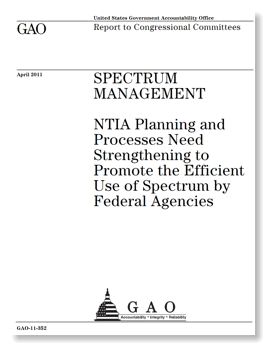New GAO Report on NTIA & Federal Spectrum Management
Here is GAO’s summary of what they found:
NTIA is responsible for governmentwide federal spectrum management, but its efforts in this area have been limited. In 2003, the President directed NTIA to develop plans identifying federal and national (both federal and nonfederal) spectrum needs, and in 2008, NTIA issued the federal plan. GAO found this plan has several limitations, does not identify governmentwide spectrum needs, and does not contain key elements and best practices of strategic planning. NTIA has yet to issue the national plan. Furthermore, NTIA’s primary spectrum management operations do not focus on governmentwide needs. Instead NTIA depends on agency self-evaluation of spectrum needs and focuses on interference mitigation, with limited emphasis on holistic spectrum management. Lacking a strategic vision, NTIA cannot ensure that spectrum is being used efficiently by federal agencies. Additionally, NTIA’s data management system is antiquated and lacks internal controls to ensure the accuracy of agency-reported data, making it unclear if decisions about federal spectrum use are based on reliable data. NTIA is developing a new data management system, but full implementation of the system is years away.
Federal agencies use spectrum for many purposes such as emergency communications and national defense, and NTIA requires the agencies to periodically evaluate their current and future spectrum needs. Agencies are supposed to ensure spectrum assignments fulfill established mission needs; however, NTIA does not have specific requirements for agencies to justify their spectrum assignments or validate data used for these evaluations. Consequently, NTIA has limited assurance that the data used to make spectrum management decisions are accurate. Federal agencies rely heavily on their program offices to obtain data for the required evaluations and often face challenges, such as resource constraints and staff turnover, when coordinating with field program staff. Given that validating spectrum assignments could require significant agency resources, it would be beneficial for NTIA to consider options for a different approach to obtain and validate critical spectrum assignment information from the agencies, such as requiring agencies to conduct site surveys or attest to the accuracy of data they submit.
In response to recent initiatives, NTIA has taken steps to identify spectrum that could be made available for broadband use. First, NTIA evaluated various spectrum bands and identified 115 megahertz of spectrum that could be made available for broadband within the next 5 years based on criteria it developed. Second, NTIA developed an initial plan and timetable for evaluating and repurposing additional spectrum for broadband use in 10 years. Affected federal agencies—that is, those agencies operating devices in the spectrum bands being evaluated—encountered difficulties providing NTIA with the necessary data and analyses during the most recent evaluation. For example, according to the affected agencies, they were required to analyze and submit a significant amount of detailed impact analyses that were not readily available. Agencies will likely continue to face challenges providing such analyses to NTIA in the future as NTIA begins evaluating a larger number of spectrum bands for possible broadband use in the next 10 years.
The basic problem is the first few words above - “NTIA is responsible for governmentwide federal spectrum management”. This is not reality under our current system. The Carter era approach of making NTIA give orders to much larger Executive Branch agencies about how to spend their own money and manage their own systems is just unrealistic in the Federal Government. In January, I quoted an FAA Federal Register document that stated that federal spectrum management is “an existing process involving several Federal agencies with an interest in spectrum use, which NTIA oversees under the Department of Commerce.” This is the reality of the present system. I believe that it will only change for the better when key players realize that the present charter of NTIA is unrealistic and move much of the President’s 47 USC 305 power back to the White House. Most of the NTIA staff can stay in Commerce as the “IRAC Secretariat” - which is what they really do. The key decision makers should be back in the White House where they were until 1978. In this case, oddly, Nixon got the organization right and Carter messed it up with well intentioned but ineffective change.




![Validate my RSS feed [Valid RSS]](valid-rss-rogers.png)

